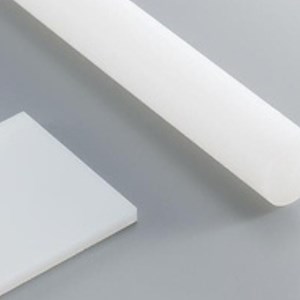Material Overview
PFA
What is PFA?
PFA was invented by DuPont as a melt processable version of PTFE and is sold under the Teflon brand name. (Teflon is better known as the trade name for PTFE but also covers both PFA and FEP).
PFA is a co-polymer product of PTFE. The co-monomer perfluoroalkyl vinyl ether interferes in the crystallisability and molecular weight to achieve good mechanical properties and melt processability without sacrificing thermal performance and chemical resistance. The key advantage of PFA is its melt processability because of lower melt viscosity than PTFE.
Because of the high strength between Carbon, Fluorine and Oxygen atoms, PFA exhibits similar properties to PTFE over a large range of temperatures. Some other differences from PTFE are: Good permeability resistance because of lower void content and better deformation (Cold flow) resistance.
PFA has an outstanding chemical resistance, even at elevated temperatures. It is resistant to strong mineral acids, inorganic bases, and inorganic oxidizing agents and to most of the organic compounds and their mixtures common in the chemical industry. However, it will react with fluorine and molten alkali.
PFA is semi-crystalline material, the maximum achievable Crystallinity is 60%.
At Fluorocarbon
We manufacture PFA semi-finished products including rod, tube and sheet by compression moulding and extrusion. In addition to this, we produce machine finished components for a range of industries including Medical, Aerospace, Semiconductor, Petrochem and Oil & Gas. We ensure the highest quality materials by mechanical property testing. All our materials are tested on site to International Standards so we can maintain a consistent quality product without impacting on lead times.
Our Semi-finished capacity and capability
- Moulded tube up to 1200mm (47”) dia
- Moulded rod up to 300mm (12”) dia
- Extruded tube up to 100mm (3.5”) dia
- Extruded rod up to 90mm (4”) dia
- Moulded sheet up to 500mm x 500mm x 40mm (19.5” x 19.5” x 1.5”)
Key features:
- Chemically stable
- Excellent dielectric strength
- Wide temperature range (-200°C- +260°C)
- Resistant to nearly all chemicals
- Antistick properties
- Low coefficient of friction
- FDA approved
- High purity
- UV Resistant
Typical applications:
- Medical tubing
- Heat exchangers
- Semiconductor baskets
- Valve liners
- Pumps and fittings
- Electrical insulation
- Insulator bushes
- Nozzles











